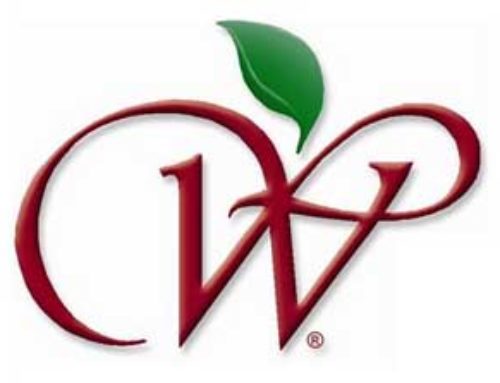
(TJ Mullinax/Good Fruit Grower photo illustration)
The announcement that U.S. orchardists will be able to ship all varieties of apples to China, starting this season, comes as a bright spot in an otherwise challenging marketing year.
U.S. trade officials announced on January 26 the opening of the market on Monday during bilateral trade talks between the two countries in San Francisco, California.

Todd Fryhover
U.S. producers have been allowed to ship Red and Golden Delicious apples to China for the past 20 years but, until now, China has refused to accept other varieties. Golden Delicious is not a popular variety in China, so the vast majority of U.S. apples exported there so far have been Reds.
“The industry needs a little bit of good news,” said Todd Fryhover, president of the Washington Apple Commission, noting that exports have been affected by a labor dispute at U.S. west coast ports, which has slowed the loading and unloading of ships.
Now, the Washington industry is dealing with an anti-dumping case filed by Mexico, its largest export market, which it is feared could lead to duties on apples going to Mexico. A stronger dollar has added to the challenges by increasing the cost of U.S. apples abroad.
Dr. Mike Willett, vice president for scientific affairs for the Northwest Horticultural Council, who attended the bilateral talks, said the agreement that U.S. Department of Agriculture officials reached with their Chinese counterparts appears to be very workable for U.S. and Northwest apple exporters and should help them strengthen their foothold in the Chinese market.
The original workplan for Red and Golden Delicious will remain in effect until the end of the 2014-15 crop year, and a new one will be put in place for other varieties for the rest of the season. Next season, all varieties will be shipped under a new protocol, which will be less restrictive as it will not require a cold treatment for codling moth. Willett said the pest is spreading in China so that country can no longer claim to be free of codling moth.
U.S. apple producers should have full access to China in the coming weeks, after administrative details have been completed. Northwest Fruit Exporters will coordinate the operational aspects of the export program for Northwest shippers.
Reciprocal
The agreement with China was reciprocal, with the U.S. government granting Chinese apple producers access to the U.S. market. Willett said this will be published in the Federal Register within the next two weeks and will go into effect after 30 days.
Fryhover said Apple Commission’s board members think the impact of imports will be very small as there is strong demand for apples in China, and China has been exporting fewer apples even while its production has been increasing.
It’s also thought that, other than in small ethnic communities on the west or east coasts, U.S. consumers generally have a negative impression of Chinese products.
“Our membership thinks we can compete with China whether in the U.S. market or in their market,” he said.
Opportunities
Though the continuing slow-down at the ports may limit Washington producers’ ability to take full advantage of full access to China this season, it bodes well for the longer term, Fryhover said. “Having an agreement in place going into next year’s crop should create a tremendous opportunities for Washington apple growers. The Washington apple industry has changed tremendously since we first gained access to China in 1994.”
Next week, he and board chair Barbara Walkenauer will be in China to host trade receptions in Shanghai, Guangzhou, and Beijing to introduce Chinese officials, importers, and retailers to new varieties that will become available. The commission received a special dispensation from the Chinese authorities to ship samples of 11 varieties of apples there especially for the events.
Red Delicious
Traditionally, half of Washington’s Red Delicious crop is exported. It’s an iconic variety because no other region of the world grows anything comparable, Fryhover said, and it’s been popular in Asia because the color red symbolizes wealth and prosperity.
As its popularity has waned on the domestic market, the need to export the variety has increased. Washington produced a bumper crop of 46 million boxes of Red Delicious in 2014—because of perfect growing conditions, not additional acreage—and Fryhover had been hoping about two-thirds of them would be exported. The port dispute has dashed those hopes. As of mid-January, 16 percent of the Red Delicious crop had been exported.
Fryhover believes Chinese consumers want new apple varieties. About 70 percent of China’s domestic production is Fuji. As the population becomes more affluent, people want to try high-quality foods with new flavors. U.S. producers have a good reputation for food safety, which is important to them as well.
Despite the bottleneck at West Coast ports, Washington apple export statistics through mid-January show that exports overall increased by 26 percent over last year. The total crop, at 150 million packed boxes, is a 30 percent increase from a year ago.
Exports to Europe, already very modest, have dropped by 36 percent this year. Poland, Europe’s largest apple producing country, is shut out of its nearest market, Russia, and is having to sell its fruit elsewhere, such as the Middle East, which has historically been an important destination for Washington apples. “Poland’s trying to ship there and countries you didn’t even know had apples are trying to ship there,” Fryhover said.
Statistics show Washington apple exports to Asia are up almost 20 percent from last year, but Fryhover emphasized that the data are compiled from certificates of compliance recorded at the packing house and don’t reflect that the load could be held up at the port or failed to reach its intended destination. Apple Commission staff who have visited Asian markets report seeing very few Washington apples for sale.
France has been shipping heavily to some Asian markets, such as Malaysia, while Chinese producers have a greater presence in Hong Kong, for example.
Canada and Mexico, which are accessible by road, have taken increasing volumes of Washington apples this season. Exports to Mexico are running 39 percent higher than a year ago, and shipments to Canada are up 27 percent.
Fryhover said this has been a particularly tough season so far for growers and shippers whose variety mix is heavy to Red and Golden Delicious and who generally export a high percentage of their fruit.
“International markets will always be more susceptible to uncontrollable situations,” he said.






Leave A Comment